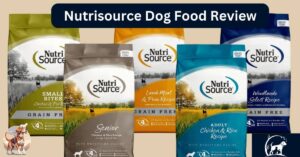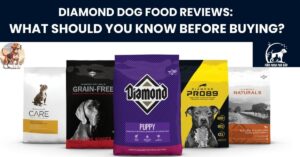Weight management dog food can be effective for controlling your dog's weight. These specially formulated diets reduce calories while maintaining nutrition.
Maintaining a healthy weight is crucial for your dog's overall well-being. Obesity in pets can lead to various health issues, including diabetes and joint problems. Weight management dog food offers a practical solution to help your furry friend shed excess pounds.
These diets typically contain fewer calories and higher fiber, promoting satiety without overfeeding. Regular exercise combined with these foods can yield significant results. Pet owners often notice improvements in their dog's energy levels and mobility. Choosing the right weight management food can make a positive difference in your pet's life, enhancing both their health and happiness.

Introduction To Weight Management In Dogs
Weight management is crucial for your dog's health. Obesity leads to serious health issues. Many pet owners seek solutions to help their dogs maintain a healthy weight. Weight management dog food plays a key role in this effort. Understanding its effectiveness is essential for pet owners.
The Rising Concern Of Obesity In Pets
Pet obesity is a growing problem worldwide. Here are some alarming statistics:
- Over 50% of dogs are overweight or obese.
- Obesity can shorten a dog's lifespan by 2 years or more.
- It increases risks for diabetes, heart disease, and joint issues.
Many factors contribute to obesity in dogs:
- Poor diet choices.
- Lack of exercise.
- Genetics and breed predispositions.
Goals Of Weight Management Diets
Weight management diets aim to help dogs lose or maintain weight. Key goals include:
| Goal | Description |
|---|---|
| Weight Loss | Promotes gradual loss of excess fat. |
| Weight Maintenance | Supports a stable weight after losing pounds. |
| Improved Health | Reduces risks of obesity-related diseases. |
These diets often contain:
- Lower calories.
- High fiber for satiety.
- Quality protein to maintain muscle mass.
Choosing the right diet is essential for effective weight management.

Components Of Weight Management Dog Food
Understanding the components of weight management dog food is essential. This food is designed to help dogs lose weight safely. It contains specific ingredients that promote a healthy lifestyle.
Key Ingredients And Their Benefits
Weight management dog food includes special ingredients. These ingredients provide essential nutrients while controlling calories.
| Ingredient | Benefits |
|---|---|
| High-quality protein | Supports muscle maintenance and promotes satiety. |
| Fiber | Helps dogs feel full and aids digestion. |
| Low-fat content | Reduces overall calorie intake. |
| Omega fatty acids | Promotes healthy skin and coat. |
| Vitamins and minerals | Supports overall health and immune function. |
Homemade Dog Food
Caloric Content Considerations
Caloric content is a critical factor in weight management. Dogs need fewer calories to lose weight. Weight management dog food usually contains fewer calories per cup.
- Look for low-calorie options.
- Check the serving sizes on the package.
- Monitor your dog's weight regularly.
It's vital to balance your dog's meals. Adjust portions based on activity levels. Consult your vet for personalized advice.
Vet Insights On Weight Management Food
Veterinarians play a crucial role in guiding pet owners. They understand how weight management dog food can support your pet's health. Many pet owners have questions about these specialized diets. Here, we explore insights from vets on their effectiveness.
Clinical Evidence Supporting Diet Effectiveness
Numerous studies support the use of weight management food. These diets help pets lose excess weight effectively. Here are some key findings:
| Study | Findings |
|---|---|
| Canine Obesity Study 2020 | 70% of dogs lost weight on specialized diets. |
| Weight Management Research 2021 | 65% of pets maintained weight loss after 6 months. |
| Long-term Diet Efficacy Study 2022 | 80% of dogs showed improved health markers. |
Take advice from Pet Expert Dr Marty
ESA Pet is an online service that helps you get a legitimate ESA letter
Pet vitamin supplements and grooming products
Vets recommend these diets for overweight pets. Controlled calories and specific nutrients are key. These foods help maintain muscle mass during weight loss.
Common Misconceptions Addressed
Many misconceptions exist about weight management dog food. Here are some of the most common:
- All dog foods are the same. This is false. Weight management foods are specially formulated.
- Dogs can eat whatever they want. Overeating leads to obesity. Proper portion control is essential.
- Weight loss takes too long. Many pets lose weight quickly on these diets.
- Weight management food lacks nutrients. These diets contain essential vitamins and minerals.
Understanding these facts helps in making informed choices. Always consult your vet for personalized advice. They can guide you on the best options for your pet's needs.
Real-life Success Stories
Success stories highlight how weight management dog food transforms lives. These tales come from loving pet owners. They showcase real changes in their dogs' health and happiness.
Case Studies Of Weight Loss
| Dog's Name | Before Weight | After Weight | Duration | Food Used |
|---|---|---|---|---|
| Buddy | 85 lbs | 65 lbs | 6 months | Weight Control Formula |
| Luna | 78 lbs | 54 lbs | 5 months | Low-Calorie Diet |
| Max | 90 lbs | 70 lbs | 7 months | Specialized Weight Management |
These case studies show significant weight loss in dogs. Each dog followed a specific diet plan. Owners reported increased energy and improved health.
Owner Testimonials
- Sarah: “Buddy is more playful. He runs around happily now!”
- Tom: “Luna lost weight quickly. She is much healthier!”
- Emily: “Max's vet says he is in great shape. I'm so proud!”
These testimonials reflect the joy of happy, healthy dogs. Owners feel fulfilled watching their pets thrive. Weight management dog food truly makes a difference.
Comparing Weight Management Foods
Choosing the right weight management dog food can be challenging. Many brands offer various options. Understanding the key criteria helps in making the right choice.
Criteria For Choosing The Right Product
- Nutritional Balance: Look for high protein and low fat.
- Caloric Content: Ensure the food is lower in calories.
- Ingredient Quality: Choose real meat over fillers.
- Veterinary Recommendations: Seek products endorsed by vets.
- Palatability: Food should be tasty for your dog.
- Avoid Artificial Additives: Choose natural ingredients.
Top Recommended Brands By Vets
| Brand | Key Features | Price Range |
|---|---|---|
| Hill's Science Diet | High protein, low fat, vet-recommended | $50 – $70 |
| Royal Canin | Special formula for weight control | $60 – $80 |
| Purina Pro Plan | Real meat as the first ingredient | $40 – $60 |
| Blue Buffalo | Natural ingredients, grain-free options | $50 – $75 |
| Wellness CORE | High protein, low carb | $50 – $85 |
Royal Canin
Hill's Science Diet
Purina Pro Plan
Blue Buffalo
Wellness CORE
Consider these brands for effective weight management. Consult your vet for personalized advice.
Feeding Guidelines And Practices
Feeding guidelines and practices are essential for effective weight management dog food. Proper portions and meal schedules can help your dog achieve a healthy weight. Here’s how to make the most of your dog’s diet.
Determining The Right Portion Sizes
Portion sizes play a crucial role in weight management. Follow these steps to determine the right amount:
- Check the packaging: Most dog food bags provide serving size recommendations.
- Consider your dog's weight: Adjust portions based on your dog's current weight and target weight.
- Consult your vet: A veterinarian can offer personalized advice.
| Dog Weight (lbs) | Daily Portion Size (cups) |
|---|---|
| 10-20 | 1/2 – 1 |
| 21-40 | 1 – 1 1/2 |
| 41-60 | 1 1/2 – 2 |
| 61-80 | 2 – 2 1/2 |
| 81+ | 2 1/2 + |
Frequency And Timing Of Meals
Meal frequency and timing are vital for weight management. Follow these tips:
- Feed twice a day: Split daily portions into two meals.
- Stick to a schedule: Feed your dog at the same times each day.
- Avoid free-feeding: Limit access to food throughout the day.
These practices help regulate your dog's metabolism. Consistency promotes better weight management.
Common Challenges And Solutions
Weight management dog food can help your pet lose weight. Yet, challenges often arise. Here are common issues and effective solutions.
Overcoming Pickiness In Dogs
Many dogs resist new food. This can make weight management tough. Here are ways to encourage your dog:
- Mix with old food: Gradually blend the new food with the old. Start with a small amount of new food.
- Try different flavors: Some dogs prefer certain flavors. Experiment with different brands.
- Warm it up: Slightly warm the food. This enhances the aroma and makes it more appealing.
- Use wet food: Adding a bit of wet food can entice your dog.
Adjusting To Dietary Changes
Switching to weight management food needs time. Dogs may experience digestive issues. Here are steps to make the transition smoother:
- Gradual change: Slowly introduce the new food over a week.
- Monitor portions: Follow serving sizes on the label. Adjust based on your dog's weight.
- Regular feeding schedule: Keep meal times consistent. This helps your dog adapt.
- Hydration: Ensure your dog drinks enough water. This aids digestion and helps reduce hunger.
With patience and the right strategies, dogs can adapt successfully.

Integrating Exercise With Diet For Optimal Results
Weight management dog food can help your pet lose pounds. Yet, combining it with exercise boosts effectiveness. Regular activity keeps dogs healthy and happy. It helps burn calories and build muscle. A balanced approach leads to better results.
Recommended Exercises For Overweight Dogs
Engaging your dog in fun exercises is crucial. Here are some recommended activities:
- Walking: Start with short walks. Gradually increase distance.
- Fetch: Play fetch with a soft toy. It's great for cardio.
- Swimming: A low-impact workout. Ideal for joints.
- Agility Training: Set up an obstacle course. It challenges both mind and body.
- Hide and Seek: A fun game that encourages movement.
Balancing Diet And Activity Levels
Finding the right balance is key. Monitor your dog's food intake. Ensure it matches their activity level.
| Activity Level | Daily Caloric Intake |
|---|---|
| Low (less than 30 minutes) | 400-600 calories |
| Moderate (30-60 minutes) | 600-800 calories |
| High (over 60 minutes) | 800-1000 calories |
Adjust portions based on exercise. Track your dog's weight weekly. This helps gauge progress. Always consult a vet before making changes.
Frequently Asked Questions About Does Weight Management Dog Food Work?
Does Weight Management Dog Food Work?
Weight management dog food can be effective for controlling your pet's weight. These specially formulated diets contain fewer calories while still providing essential nutrients. Regular use, combined with exercise, can help your dog shed excess pounds and maintain a healthy weight.
What Ingredients Are In Weight Management Dog Food?
Weight management dog food typically includes high-quality protein, fiber, and low-fat content. Ingredients like chicken, brown rice, and vegetables are common. These components help your dog feel full while reducing calorie intake, making it easier to manage weight effectively.
How Long Does It Take To See Results?
Results from weight management dog food usually appear within 8 to 12 weeks. Consistency in feeding and regular exercise play crucial roles. Monitoring your dog’s weight regularly can help track progress and adjust portions as needed for optimal results.
Can All Dogs Eat Weight Management Food?
Most dogs can eat weight management food, but consult your vet first. Certain health conditions or dietary restrictions may require tailored nutrition. Your veterinarian can help determine the best option for your dog’s specific needs, ensuring a safe and effective weight loss journey.
Conclusion
Weight management dog food can be effective for many pets. It often contains fewer calories and tailored nutrients. Owners should consult their veterinarian for the best options. Regular exercise and portion control also play vital roles. Choosing the right food can lead to healthier, happier dogs and improved quality of life.














